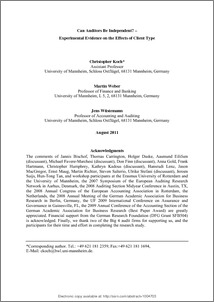|
Can auditors be independent? – Experimental evidence on the effects of client type
Koch, Christopher
;
Weber, Martin
;
Wüstemann, Jens
Dies ist die aktuellste Version dieses Eintrags.
![[img]](https://madoc.bib.uni-mannheim.de/style/images/fileicons/application_pdf.png)  Vorschau |
|
PDF
SSRN-id1004703_Pub146.pdf
- Veröffentlichte Version
Download (203kB)
|
|
URL:
|
https://ub-madoc.bib.uni-mannheim.de/31481
|
|
Weitere URL:
|
http://dx.doi.org/10.2139/ssrn.1004703
|
|
URN:
|
urn:nbn:de:bsz:180-madoc-314819
|
|
Dokumenttyp:
|
Arbeitspapier
|
|
Erscheinungsjahr:
|
2011
|
|
Ort der Veröffentlichung:
|
Mannheim
|
|
Sprache der Veröffentlichung:
|
Englisch
|
|
Einrichtung:
|
Fakultät für Betriebswirtschaftslehre > ABWL u. Finanzwirtschaft, insbes. Bankbetriebslehre (Weber 1993-2017)
|
|
MADOC-Schriftenreihe:
|
Lehrstuhl für ABWL, Finanzwirtschaft, insb. Bankbetriebslehre (Weber) > Working Papers
|
|
Fachgebiet:
|
330 Wirtschaft
|
|
Fachklassifikation:
|
JEL:
C90 , K22 , M42,
|
|
Normierte Schlagwörter (SWD):
|
Wirtschaftsprüfung , Verhaltensökonomie , Corporate Governance , Internes Kontrollsystem , Test
|
|
Freie Schlagwörter (Deutsch):
|
Wirtschaftsprüfung , Verhaltensökonomik , Corporate Governance , Internes Kontrollsystem , Test
|
|
Freie Schlagwörter (Englisch):
|
auditor independence , accountability pressure , client retention incentives , oversight board , behavioural experiment
|
|
Abstract:
|
Recent regulatory initiatives stress that an independent oversight board, rather than the management board, should be the client of the auditor. In an experiment, we test whether the type of client affects auditors’ independence. Unique features of the German institutional setting enable us to realistically vary the type of auditors’ client as our treatment variable: we portray the client either as the management preferring aggressive accounting or the oversight board preferring conservative accounting. We measure auditors’ perceived client retention incentives and accountability pressure in a post-experiment questionnaire to capture potential threats to independence. We find that the type of auditors’ client affects auditors’ behaviour contingent on the degree of the perceived threats to independence. Our findings imply that both client retention incentives and accountability pressure represent distinctive threats to auditors’ independence and that the effectiveness of an oversight board in enhancing auditors’ independence depends on the underlying threat.
|
 | Dieser Eintrag ist Teil der Universitätsbibliographie. |
 | Das Dokument wird vom Publikationsserver der Universitätsbibliothek Mannheim bereitgestellt. |
Verfügbare Versionen dieses Eintrags
 Suche Autoren in Suche Autoren in
Sie haben einen Fehler gefunden? Teilen Sie uns Ihren Korrekturwunsch bitte hier mit: E-Mail
Actions (login required)
 |
Eintrag anzeigen |
|
|
 ORCID: 0000-0001-5018-3317 ; Wüstemann, Jens
ORCID: 0000-0001-5018-3317 ; Wüstemann, Jens



 Suche Autoren in
Suche Autoren in